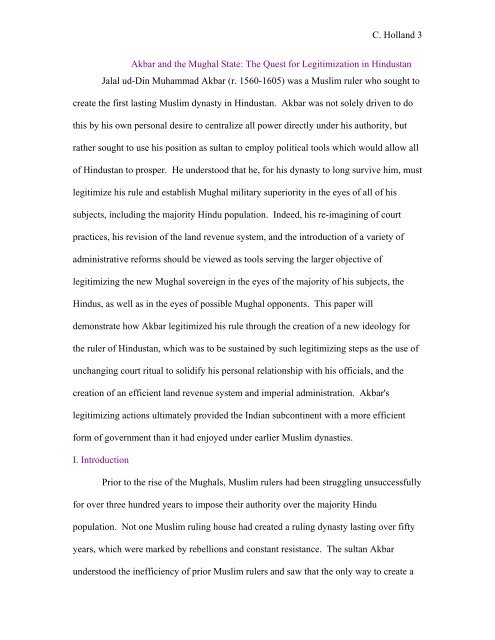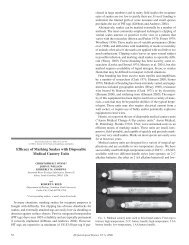Akbar and the Mughal State - University of Georgia
Akbar and the Mughal State - University of Georgia
Akbar and the Mughal State - University of Georgia
Create successful ePaper yourself
Turn your PDF publications into a flip-book with our unique Google optimized e-Paper software.
C. Holl<strong>and</strong> 3<br />
<strong>Akbar</strong> <strong>and</strong> <strong>the</strong> <strong>Mughal</strong> <strong>State</strong>: The Quest for Legitimization in Hindustan<br />
Jalal ud-Din Muhammad <strong>Akbar</strong> (r. 1560-1605) was a Muslim ruler who sought to<br />
create <strong>the</strong> first lasting Muslim dynasty in Hindustan. <strong>Akbar</strong> was not solely driven to do<br />
this by his own personal desire to centralize all power directly under his authority, but<br />
ra<strong>the</strong>r sought to use his position as sultan to employ political tools which would allow all<br />
<strong>of</strong> Hindustan to prosper. He understood that he, for his dynasty to long survive him, must<br />
legitimize his rule <strong>and</strong> establish <strong>Mughal</strong> military superiority in <strong>the</strong> eyes <strong>of</strong> all <strong>of</strong> his<br />
subjects, including <strong>the</strong> majority Hindu population. Indeed, his re-imagining <strong>of</strong> court<br />
practices, his revision <strong>of</strong> <strong>the</strong> l<strong>and</strong> revenue system, <strong>and</strong> <strong>the</strong> introduction <strong>of</strong> a variety <strong>of</strong><br />
administrative reforms should be viewed as tools serving <strong>the</strong> larger objective <strong>of</strong><br />
legitimizing <strong>the</strong> new <strong>Mughal</strong> sovereign in <strong>the</strong> eyes <strong>of</strong> <strong>the</strong> majority <strong>of</strong> his subjects, <strong>the</strong><br />
Hindus, as well as in <strong>the</strong> eyes <strong>of</strong> possible <strong>Mughal</strong> opponents. This paper will<br />
demonstrate how <strong>Akbar</strong> legitimized his rule through <strong>the</strong> creation <strong>of</strong> a new ideology for<br />
<strong>the</strong> ruler <strong>of</strong> Hindustan, which was to be sustained by such legitimizing steps as <strong>the</strong> use <strong>of</strong><br />
unchanging court ritual to solidify his personal relationship with his <strong>of</strong>ficials, <strong>and</strong> <strong>the</strong><br />
creation <strong>of</strong> an efficient l<strong>and</strong> revenue system <strong>and</strong> imperial administration. <strong>Akbar</strong>'s<br />
legitimizing actions ultimately provided <strong>the</strong> Indian subcontinent with a more efficient<br />
form <strong>of</strong> government than it had enjoyed under earlier Muslim dynasties.<br />
I. Introduction<br />
Prior to <strong>the</strong> rise <strong>of</strong> <strong>the</strong> <strong>Mughal</strong>s, Muslim rulers had been struggling unsuccessfully<br />
for over three hundred years to impose <strong>the</strong>ir authority over <strong>the</strong> majority Hindu<br />
population. Not one Muslim ruling house had created a ruling dynasty lasting over fifty<br />
years, which were marked by rebellions <strong>and</strong> constant resistance. The sultan <strong>Akbar</strong><br />
understood <strong>the</strong> inefficiency <strong>of</strong> prior Muslim rulers <strong>and</strong> saw that <strong>the</strong> only way to create a





